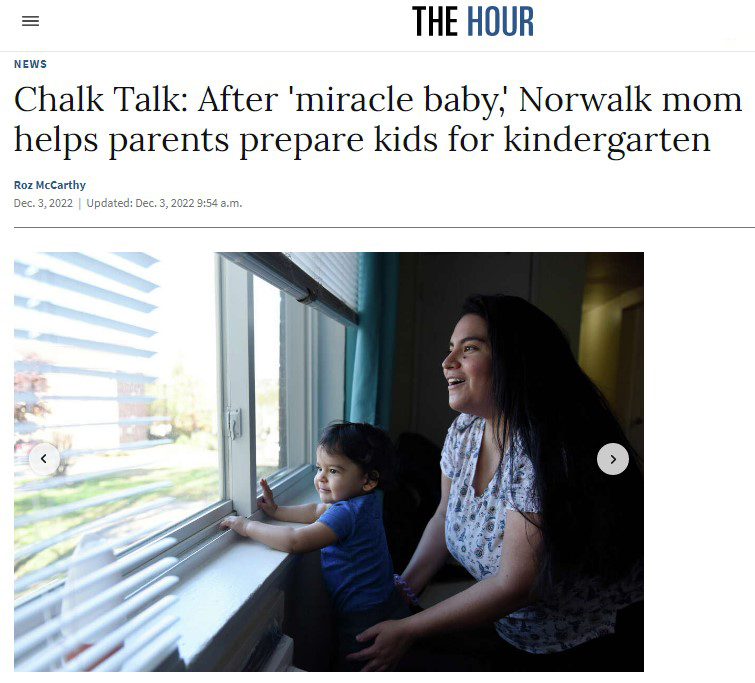
“He is a miracle baby,” said Karina Mendez, tightly clutching 15-month old Samuel who sat in her lap. Told she could never have a baby, she found herself pregnant in 2020 to her absolute delight. “I had a one-in-a-million chance of getting pregnant.”
Because of her high-risk pregnancy, Mendez starting working with Family & Children’s Agency, and she has never stopped. FCA supported her during her high-risk pregnancy with a social worker, therapist and health care, and after Samuel was born prematurely, FCA arranged for weekly sessions with a trained home visitor.
“Raising a child does not come with instructions,” she said. “It’s been a huge learning process.”
During one of these sessions, Mendez completed the Ages & Stages Questionnaire (ASQ), which helps parents assess the development of their child. She could see where Samuel was on target and where he was behind, and she learned how to help bolster his weaker areas. She found it so helpful that she became a Community Advocate, helping parents understand what the ASQ is and why it’s important to their child’s life.
“I realize now the importance of knowing and helping your child develop,” she said, “and that’s made me want to help other parents.”
Mendez is part of a city-wide effort to ensure that children are ready for kindergarten, and the ASQ is the centerpiece of that push. With funding from the Grossman Family Foundation and the State of Connecticut, agencies across Norwalk – schools, preschools, doctors, and social service agencies – have adopted the ASQ as the tool they use to screen babies and toddlers. The goal is to have everyone speaking the same language when talking about children’s development.
As a result, ASQ screening is required in all school readiness programs that receive state funding, for all home visiting programs, and as part of kindergarten registration. Recent grants have increased outreach within the Norwalk Housing Authority, Norwalk Hospital, and the Norwalk Health Department.
“The idea is to reach families and reach a lot of them,” said Marcia Hughes, a University of Hartford research analyst who studies Norwalk’s data as part of the Grossman grant. “The sooner you address problems, the better the child will be.”
The results have been encouraging, especially in the growth of repeat screenings, meaning parents are using the ASQ at different ages of their children. In 2018, 918 children had two or more ASQ screenings; in 2021, that number increased to 2066, according to Hughes.
“The kindergarten trends are going in the direction we want,” she said. In 2018, 68% of kindergarten children were developmentally ready in all areas. In 2021 the number increased to 74%, although the numbers dropped in 2022 because of COVID.
And parents are the most important players. Parents complete the questionnaire about their child’s behavior. For example, when a child is 6 months, the questions include, does your baby squeal, does he lift his legs high enough to see his feet, does your baby pick up a small toy with only one hand, does she coo at herself in the mirror
Parents can answer yes, sometimes, or not yet. Many answers of “not yet” may indicate developmental delays, and the ASQ website offers games to play with babies to address those delays. There’s even an easy-to-use app, Sparkler, that has the ASQ questions and lots of ideas for parents.
Because little Samuel was born prematurely, Mendez used the ASQ and saw that he was delayed in his gross motor skills. She looked at the Sparkler app. “The games that were suggested were such simple
things, but when you don’t know, you have no clue,” she said.
Samuel was slow to crawl. The Sparkler app suggested that she pull a little toy in front of him. He kept trying to move to get that dog.
Finally, he crawled.
Now that he’s 15 months, new issues appear. When he started having tantrums, she turned to the Sparkler app and learned more about why children have tantrums and how she could respond.
She plays Freeze with him – they dance and then stop, and she explains they stopped, but they’ll start again soon. “I remind him in a tantrum, ‘I know you are upset, but we’re going to stop now.’ I use a calm and level voice,” she said. “He calms down and we go on with an activity.”
As a Community Advocate assigned to the Room to Grow Preschool, Mendez helps parents with the ASQ, reviews results with them, and discusses what they can do to help their child.
“Last week I had a really nice conversation with a parent who was concerned about her 4-year old. She was so happy to have access to resources,” she said.
Maria Cloke, the ASQ Community Liaison in the Family & Children’s Agency, said if families need more support, parents are urged to call 211, Connecticut’s Child Development Infoline, where they can connect to more services.
“Norwalk’s work is recognized in the state,” said Marijane Casey, Maternal and Child Heath Consultant.
“People are so passionate about this work. If you can do it anywhere, you can do it in Norwalk.”